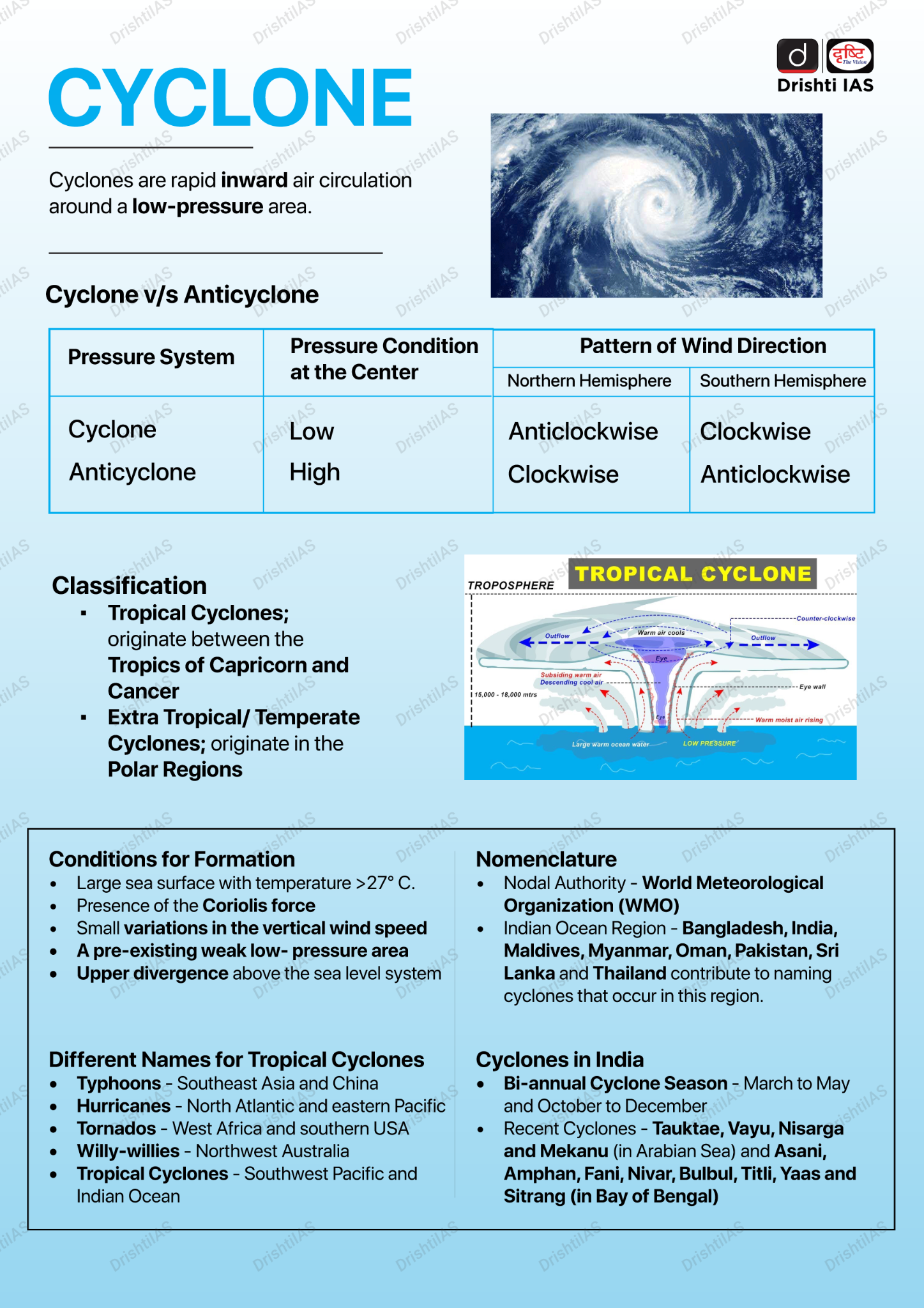Important Facts For Prelims
Cyclone Remal
- 25 May 2024
- 5 min read
Why in News?
The India Meteorological Department (IMD) has issued a warning for a potential severe cyclonic storm, named Cyclone Remal, that could impact the coasts of West Bengal and Bangladesh.
What are the Key Insights About Cyclone Remal?
- Naming: The name 'Remal' in the list of tropical cyclones is given by Oman. It will be the first cyclone to hit the region this 2024 pre-monsoon season.
- 'Remal,' meaning 'sand' in Arabic.
- Origin: Bay of Bengal (BoB).
- Factors Contributing to the Formation:
- A depression (an area of low pressure characterised by circulating winds and atmospheric instability) has formed over the central Bay of Bengal, serving as the genesis for Cyclone Remal.
- The Bay of Bengal, experiences water temperatures higher(2–3°C) warmer than average. This warm water provides the energy needed for cyclones to form and intensify.
- The Madden Julian Oscillation, a band of clouds moving eastward, along with the winds and warm ocean waters, is currently moving south of the Bay of Bengal. These winds play a role in initiating cyclones due to their rotational effect.
- Potential Impact: The cyclone may impact the Sundarbans region if the landfall happens on the Indian coast and coincides with high tide, potentially causing partial damage to the fragile ecosystem.
- The shallow bathymetry and the funnel-shaped geography of the northern Bay of Bengal can amplify the intensity of the cyclone as it approaches the coast, increasing the risk of storm surges and flooding.
- Previous Cyclones: The cyclone scare comes close to the anniversaries of previous devastating cyclones, such as Yaas (2021), Amphan (2020), Cyclone Fani( 2019), and Aila (2009) which caused massive damage in the Sundarbans and other parts of West Bengal.
- The state's disaster management authorities and local communities are drawing on the lessons learned from these past experiences to better prepare for and mitigate the potential impact of Cyclone Remal.
Note:
- The Bay of Bengal (BoB) experiences more cyclones than the Arabian Sea (A.S.) by a ratio of about 4:1. However, a 2022 study found that the frequency of cyclones in the A.S. has increased by 52% from 2001–2019, while the Bay of Bengal’s frequency has slightly decreased.
- The BoB is relatively shallower than the A.S. The larger surface area of the BoB allows faster heating causing higher evaporation. Inturn forms a high-pressure zone in the area causing instability in the region. All these factors make it suitable for cyclone formation.
- The A.S. has traditionally seen fewer cyclones due to higher salinity, lower sea surface temperatures, and disadvantageous wind systems.
- However, changes in ocean and atmosphere warming patterns are leading to more frequent and severe tropical cyclones in the Arabian Sea.
- The positive phase of the Indian Ocean Dipole (IOD) and human-induced climate change are contributing to the intensification and higher frequency of cyclones in the Arabian Sea.
UPSC Civil Services Examination, Previous Year Questions (PYQs)
Prelims
Q. In the South Atlantic and South-Eastern Pacific regions in tropical latitudes, cyclone does not originate. What is the reason? (2015)
(a) Sea surface temperatures are low
(b) Inter-Tropical Convergence Zone seldom occurs
(c) Coriolis force is too weak
(d) Absence of land in those regions
Ans: (b)
Ans:
- The most proximate reasons for the lack of cyclones in the South Atlantic and South Eastern Pacific ocean is the rare occurrence of the Inter-Tropical Convergence Zone (ITCZ) over the region.
- It becomes very difficult or nearly impossible to have genesis of tropical cyclones, unless synoptic vorticity (it is a clockwise or counterclockwise spin in the troposphere) and convergence (i.e., large scale spin and thunderstorm activity) are provided by ITCZ.
- Therefore, option (b) is the correct answer.





